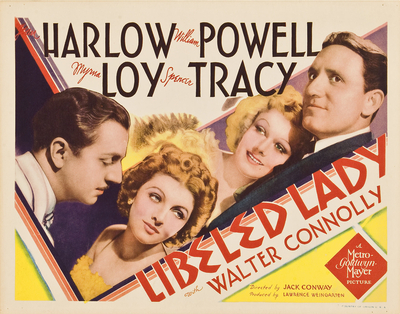It's a regrettable fact that the Thin Man films starring Myrna Loy and William Powell – six films made between 1934 and 1947 – got gradually but definitely worse. Which isn't to diminish the enormous charm of the first film or the chemistry between the leads; this affinity was so palpable – and marketable – that Loy and Powell made another half dozen movies together as characters other than Nick and Nora Charles.
Libeled Lady was made two years after Nick and Nora had their onscreen debut in W.S. Van Dyke's The Thin Man, but between then MGM paired Powell and Loy together in two other films – the crime drama Evelyn Prentice (1934) and the musical biopic The Great Ziegfeld (1936). A marketing machine like MGM would have presumed that they were just giving the people what they wanted, but what audiences were really waiting for was the pair in another comedy, and director Jack Conway delivered.
The film begins teasingly with another couple – Spencer Tracy's Hagerty, editor of a New York City newspaper, and his long-suffering fiancée Gladys, played by Jean Harlow. For not the first time Hagerty stands up Gladys at the altar, called back to the newsroom to run damage control when his paper prints fake news – a mistaken rumour that rich playgirl Connie Allenbury (Loy) has been playing homewrecker while in London.
Hagerty's boss has a vendetta against Connie's millionaire father, and his zeal to smear the man has landed the paper a $5 million libel suit from his daughter. This could sink the paper, so Hagerty cooks up a scheme to create a honey trap for Connie, catching her in flagrante during a liaison with a married man to force her to drop the suit. The only problem is that the only man he knows with seduction skills suitable to the task is Bill Chandler (Powell), a reporter Hagerty fired.
For these first scenes Libeled Lady is a newspaper comedy not unlike His Girl Friday - which would, of course, not be released for another four years, but the genre was already well established, the newsroom and its denizens one of many archetypical big city places. To anyone only familiar with the modern newsroom, Hagerty's Manhattan broadsheet might seem odd, lacking as it does anyone who looks like they have a degree from Columbia or Harvard, or interns living on trust funds; the closest thing is an overworked copy boy with an unfortunate haircut.
There's no reason for Libeled Lady to be as good as it is. Conway, the director, was just one of MGM's stable of journeyman contract directors, alongside men like Mervyn LeRoy, Sam Wood, Sidney Franklin, Clarence Brown and others whose reputations stand in the shadow of colleagues such as King Vidor, George Cukor and Fritz Lang. Before directing Libeled Lady he had made Tarzan and his Mate and Tale of Two Cities; afterward he would direct Saratoga and Boom Town, just a fraction of his filmography of over a hundred movies released between 1912 and his death in 1952.
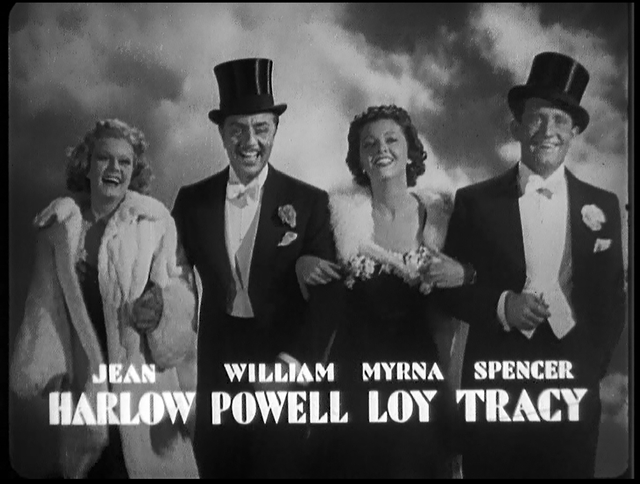
The film is built around two couples who bounce off each other – the vulgar, lowbrow "mugs" (Tracy and Harlow) contrasted with the elegant sophisticates (Loy and Powell). To make his trap work, Hagerty needs to get Chandler married fast, and chooses his own fiancée to play the role of the wronged wife. At first it's hard to see where Powell's Chandler got his ladykiller reputation – both Harlow and Loy are able to resist him easily, one because he represents everything she hates about Hagerty's profession, the other because she pegs him for a male gold digger after her money.
On board an ocean liner sailing from London to New York, the film shifts into a comedy of manners, with Powell trying to insinuate himself into the company of Loy's playgirl and her wealthy daddy. He tries to make himself an instant expert on fly fishing – daddy's hobby – and chivalrously shields Connie and her father from a pair of tedious mother-and-daughter social climbers. He makes himself a useful diversion but nothing more, and Powell's Chandler flounders in their company, a cringeworthy mess of bad jokes and social faux pas breaking against their distracted indifference.
These scenes highlight what has always been the appeal of screwball comedy for me – a comedy based less on any rom-com formula than on discomfort and cruelty. (Always the best recipe for great comedy. Argue all you want; I know I'm right.) In Romantic Comedies in Hollywood from Lubitsch to Sturges, James Harvey sums up the verbal bloodsport played by Tracy, Harlow, Powell and Loy in the film:
"Everyone in the quartet gets his turn at everyone else. Everyone wins, and everyone loses, at least one crucial encounter. And the effects are complex because we are rarely on the side of one or the other of the combatants. We are involved in the atmosphere of insult – a very heady one – and in the ingenuity of the manipulations. The movie makes us want to see everybody put down – and eventually we do. With exact emotional logic: proceeding from the doghouse of the newsroom to the civilized acrimony of the ocean liner, where we recognize that the most painful aggression of all is to be treated as Powell is by Loy – with infinite inattention."
What makes Libeled Lady different from other screwball comedies – all the more so because of its title – is that the agent of chaos in the film isn't Loy but Powell's Chandler. When you think of the great screwball comedies you can't help but see all those strong, willful female protagonists wreaking havoc with everyone they meet – everyone from Claudette Colbert in It Happened One Night to Carole Lombard in My Man Godfrey to Constance Bennett in Topper to Barbara Stanwyck in The Lady Eve and Ball of Fire to the pinnacle: Katharine Hepburn in Bringing Up Baby and Holiday.
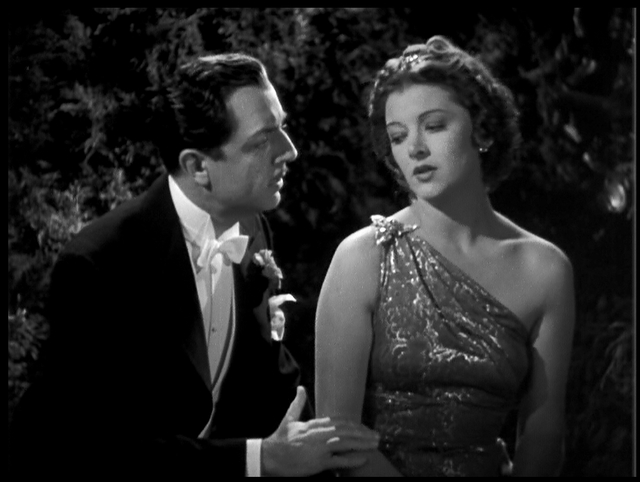
Powell is remembered onscreen as Nick Charles – a wry, nonchalant nonconformist; if not the smartest man in any room, certainly the one who understands what's really going on better than anyone else. What's often forgotten is what a great physical comedian he was, and in one scene in Libeled Lady he reminds us of it.
Persisting in Hagerty's plot, Chandler gets himself invited to the Allenburys' country estate for some fly fishing. Despite his apparently effortless underhand cast, he's still unable to catch anything; he loses his handy fishing manual in the river, and tumbles into the water trying to retrieve it. An inadvertent cast ends up hooking the stream's notorious monster fish, who drags Powell through the rapids, a soaked man stumbling and tripping his way downstream. It's hard to figure out who has caught whom.
This spectacle of physical humiliation marks a turning point in the plot; while her father is now convinced that Chandler is a consummate angler, Connie starts to come around to him, helped by his inability to play the role of the seducer any longer. And he's falling for her, so he has to start playing everyone against each other; if he can convince Connie to drop the suit before Hagerty springs his honey trap, he has to get Gladys to fall for him to help stall for time – not a difficult task considering how utterly the newspaperman neglects his girlfriend.
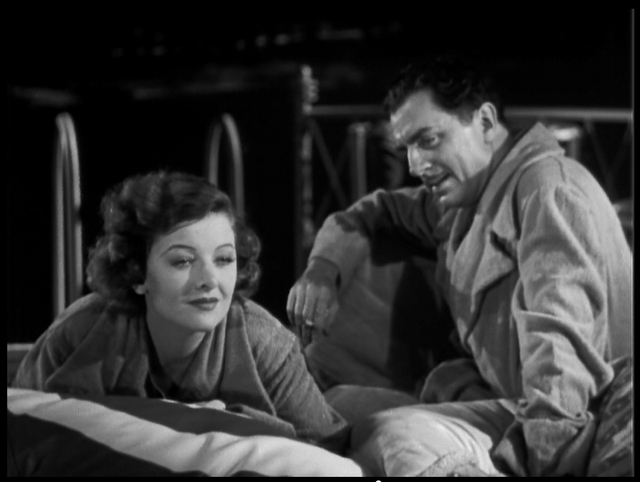
This should play like a farce but it's the point at which the film becomes most like a romantic comedy, entirely because of how well Loy and Powell sell their attraction to each other. (This is despite the fact that Powell was actually engaged to Harlow, though it's rumoured that Powell and Loy had an affair during the making of Libeled Lady.) Much as the Thin Man movies rest on the foundation of how perfect Nick and Nora are together – as the films got worse, their sole pleasure was watching Loy and Powell interact – the engine powering Libeled Lady to its conclusion is seeing Chandler and Connie overcome the obstacles they've put in the way of coming together; they become the adults, forcing the "kids" (Tracy and Harlow) to realize that they really do love each other.
Loy had a long career in Hollywood, starting in the silent era. She was cast as a femme fatale or even an oriental vamp for a decade before Manhattan Melodrama (with John Dillinger giving the film priceless publicity by getting shot outside a screening) and The Thin Man made her a star.
The imposition of the new Motion Picture Code was a gift to Loy, and her career after that was often the role of the ideal wife, from Nora Charles to The Best Years of Our Lives to Mr. Blandings Builds His Dream House to Cheaper by the Dozen. It was a reputation Loy would find laughable, famously saying "Some perfect wife I am. I've been married four times, divorced four times, have no children, and can't boil an egg."
For die-hard Myrna Loy fans, this does nothing to diminish her appeal.
Another surprising detail in Libeled Lady is the rich daddy, played by Walter Connolly, one of those invaluable and unsung character actors who filled the studio's payroll. Seven years into the Great Depression and three years into FDR's first term as president, he isn't played as a harsh, grasping plutocrat but as oafish and even lovable, a self-contained man with a healthy respect for his independent daughter. As the film fades to black, he's obviously been left with the job of sorting out the tangled web of inadvertent bigamy created by the two couples.
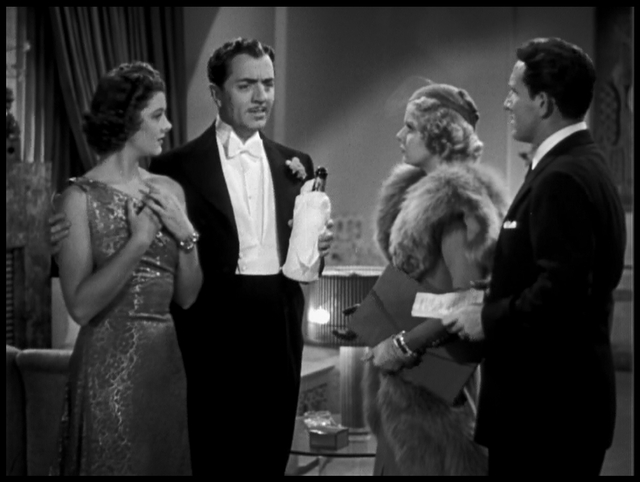
Chalk this up to confirmation of movies as escapism during one of the most desperate stretches in modern history. Even at a remove of nearly a century, the madcap, gently anarchic world created by screwball comedies of the '30s has an indelible appeal, an urban fantasy that real life could never duplicate. Harvey again:
"Where a Capra film tries to blackmail us into a feeling of communality, movies like Libeled Lady – with their sense of an intelligence that is both heightened and publicly shared – suggest other possibilities: the communality of the ideal city, where we are all tough and funny and smart together, and connected because we're free instead of stuck with one another – different, of course, from the sustaining bonds and sheltering simplicities of the ideal small town. And a lot riskier."
I have to thank Harvey for his analysis, since it goes a long way towards explaining why I've craved screwball comedies so much, in a year where lockdowns have put friends, family, work, travel and so many of the small but stimulating interactions of urban life that I take for granted on what seems now like an indefinite hold. An unemployed man or woman would sit through a screwball comedy imagining a world that might feel hapless but never hopeless; I'm ordering them from Amazon to try and remember when (or maybe even if) we were "tough and funny and smart together."
Mark Steyn Club members can let Rick know what they think by logging in and sharing in the comments below, as access to the comments section is one of many benefits that comes along with membership in the Mark Steyn Club.

